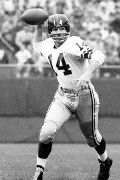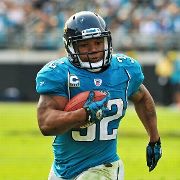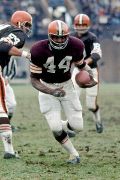|
With his grandson on one side and his son-in-law on the other, 87-year-old Andy Mousalimas chose Philadelphia Eagles running back LeSean McCoy with the first pick of his 50th and final fantasy football league draft. And so began the beginning of the end of an era that started in 1963 in a rumpus room in a home in Oakland, where Mousalimas made the first -- and possibly worst -- pick in the history of fantasy football: George Blanda over Jim Brown.  Fifty years. Mousalimas has a lot tied up in this silly game. He still has the original hand-written draft list from 1963, with names like Blanda and Brown, Y.A. Tittle and Fran Tarkenton. He doesn't claim to have invented fantasy football -- a minority owner of the Raiders named Bill Winkenbach gets the credit -- but he is undoubtedly its most energetic caretaker and resident historian. He is the keeper of the oft-repeated lore. In his opening speech to those assembled in the upstairs room of an Oakland bar and grill Tuesday night, Mousalimas recounted his favorite story: how, in 1979, a team drafted Cardinals tight end J.V. Cain two weeks after he died. Mousalimas stopped to point out the man who made the pick, Frank Pappalardo. "Don't blame me -- it was my partner," Pappalardo says. "My partner wanted that guy." It sounded a lot like a line he'd been called upon to recite several times a year since 1979. There were 16 members of the original Greater Oakland Professional Pigskin Prognosticators League (GOPPPL), and Mousalimas is the last active member. Many have died, and others moved on. Two of them, Ron Wolf and Scotty Stirling, ended up as NFL general managers, Wolf with the Packers, Stirling with the Raiders. In fact, Stirling was a two-sport GM, working in that capacity for the Golden State Warriors and New York Knicks as well. "They had bigger things to do," Mousalimas says. "Me? I owned a pub, so I'm still playing." Even with 50 years of turnover, it's a veteran group gathered on this night, with a few younger people sprinkled in among the old-timers. Perhaps the average age of the contestants is a reason Robert Griffin III didn't go until the ninth round and Trent Richardson wasn't taken until the seventh pick of the fifth round. Stripes have to be earned in this room. Mousalimas drafts with his grandson, Harry Ahlas, and son-in-law, Dean Gassoumis. "Grandpa calls the shots," Ahlas says. Mousalimas-Ahlas-Gassoumis -- there are no cutesy team names in this league -- got Maurice Jones-Drew with the eighth pick of the fifth round. Everybody whooped and hollered because MJD is still holding out, but Mousalimas shouted back, "He's gonna play. What's he gonna do, go coach at De La Salle High School?" "The razzin's nothing like it used to be," Mousalimas says. "I remember when you could barely hear the picks because everyone was raggin' on each other." They still draft in person, with magazines and newspapers and hand-written sheets -- no laptops -- in front of them. Their draft consists of 18 rounds, and the final round is the "Utility" pick. A team can take a player at any position, and judging by the picks Monday night, most teams grab an extra quarterback. As Mousalimas' final pick was nearing, he and his grandson were silently hoping nobody would snag the name they'd quietly circled on Andy's sheet. And one pick before his turn, Mousalimas yelled over to his buddy Tony Torres, "Don't you go taking my guy!" Torres had no idea who "my guy" was, so he just smiled at Mousalimas and called out, "Jay Cutler." Right here, in the span of time it took Torres to utter those three syllables, you could see the benefit of holding a draft that includes human interaction. The idea of sitting at a computer and silently clicking on names to add to an electronic list seemed sad and lonely judged against the scene that unfolded immediately after Torres said the name of the Chicago Bears quarterback. Mousalimas is hard of hearing, but he heard Torres loud and clear. Jay Cutler? Jay Cutler was "my guy." In the time it took Mousalimas to decide on Cutler as his final pick and the time it took Torres to steal him, Mousalimas had fallen in love with the idea of having Cutler as an insurance policy. I'm sure it's possible to have a wonderful moment with your buddies when you're all sitting at laptops miles -- or time zones -- apart, but it's not quite the same as seeing an 87-year-old man furious about losing out on Jay Cutler bounce up and slap the table in front of him -- both hands! -- at the end of a 2½-hour draft. Mousalimas settled down -- he'd lost Philip Rivers a few rounds before, so the anger was building -- and, at the urging of the crowd, chose 49ers quarterback Alex Smith as his final pick in his final draft. He's won just three times in 50 years, but there's a mischievous look on his face as he gives a little wink and says, "I think I might have held back all those years because I was running the league out of my place. ... At least that's what I say now."  GOPPPL became the Kings X League when Mousalimas and a partner bought the Kings X bar in Oakland. The Kings X was known for fun and games -- trivia nights, gin rummy tournaments, fantasy football. At its height, the Kings X League consisted of 200 fantasy teams divided by age or sex or eagerness to gamble large amounts on side bets. All teams abided by one ironclad rule: They had to show up in person at the bar on Friday night before 10 p.m. to set their rosters for that weekend. Friday nights were wild in the Kings X, as you might imagine. Mousalimas was one smart businessman. "I used to love Friday nights," Mousalimas says. "There might be three guys owning one team, but they'd all come in on Friday nights. Everybody showed up, and the place rocked." The Kings X was responsible for adding yardage rules into fantasy scoring. Before 1973, a one-yard touchdown run by Pete Banaczak was worth as much as a 90-yard run by O.J. Simpson, and a guy who carried five times for 10 yards and two touchdowns was worth more than a guy who carried 20 times for 150 yards and zero touchdowns. In 1973, an assistant football coach at Oakland Tech High School and Kings X team owner researched the 1971 and '72 seasons and found that 85 percent of running touchdowns were within four yards. They instituted a yardage rule for touchdowns, which made longer rushing and passing touchdowns worth more than shorter ones. It all seems so easy now -- for the first time, Kings X is going to automated Internet-based scoring -- but how would you get information on injuries or depth charts or even deaths in the mid-'60s? The 49ers and Raiders weren't a problem -- the local papers took care of them -- but what about the Packers or Steelers or Browns? How would a GOPPPL member know whether Leroy Kelly's ankle was healed enough for him to play against the Colts on Sunday? "There was no talk radio, there was no Internet," Mousalimas says. "It was tough to do research, and we worked hard to find information." De Lauer's newsstand in downtown Oakland carried enough out-of-town newspapers to help some, but not enough. Mousalimas called out-of-town papers. He'd get the sports department, and his questions were always met with a moment of dead air before he was told the paper wasn't at liberty to release the information. It took a few calls before Andy realized everyone in sports departments across America assumed he was a bookie.  He wasn't, but what was he? That's a tough question. How could he explain, in the mid-1960s, that he was calling because he and his friends draft make-believe teams that compete in a league that gives points for touchdowns? At least a bookie was something people understood. After his draft Tuesday night, after he'd been asked to discuss -- on camera and off -- his role in the creation of something that now has more than 20 million participants, Mousalimas says, "A lot of good times. The camaraderie, the stories ..." His voice trails off. He's finished after this season. "I'm almost 88 years old, and it's time," he says. "But I'll tell you, a lot of great memories came welling up tonight." He talks about the friends he's lost and the ones he's gained and it's clear this was only tangentially about football, even from the start. It was about friends and stories and a long life lived well. Mousalimas tears up a little thinking about it. The wild Friday nights, the 3 a.m. trips to the Oakland Tribune on Monday mornings to get the paper and start tallying Sunday's scores, the Tuesday lunches when they posted that week's standings. It's crazy how something as silly as make-believe football teams can create such joy. He takes a breath and catches himself. He's 87 but strong, fit, active. There's more out there for him, and within a few seconds he's back to the present, turning toward his grandson and saying, "I really think we've got a good team this year. I think we're gonna do fine."
|
